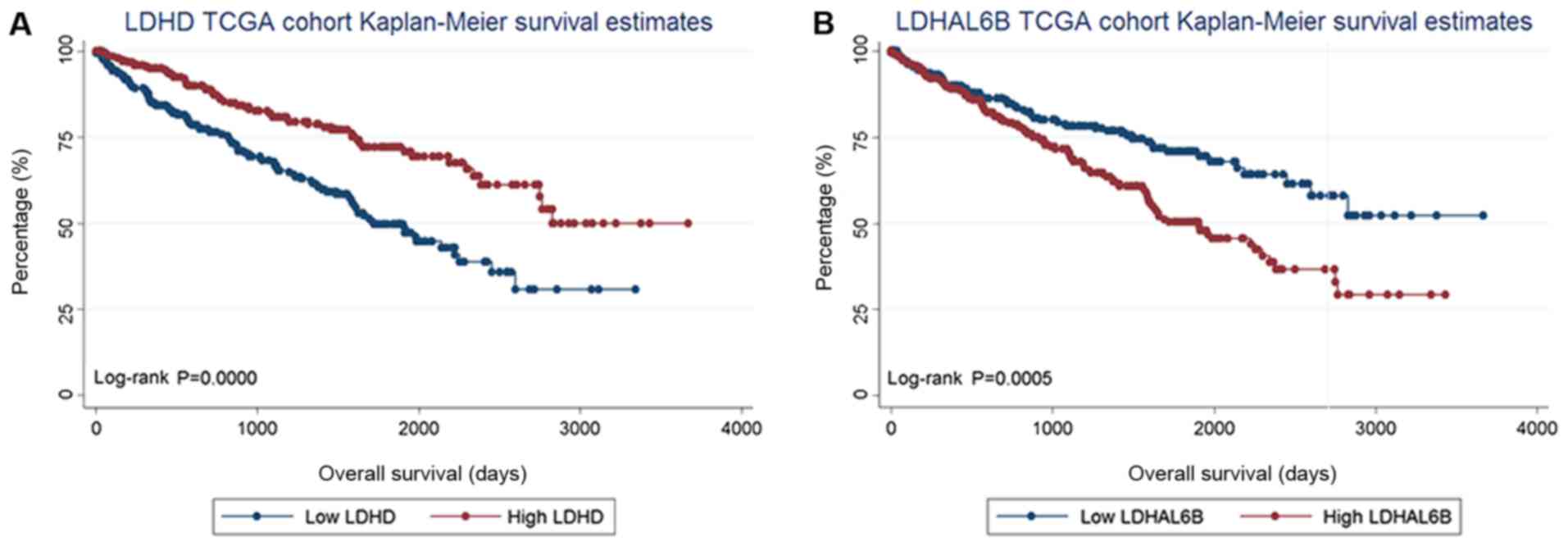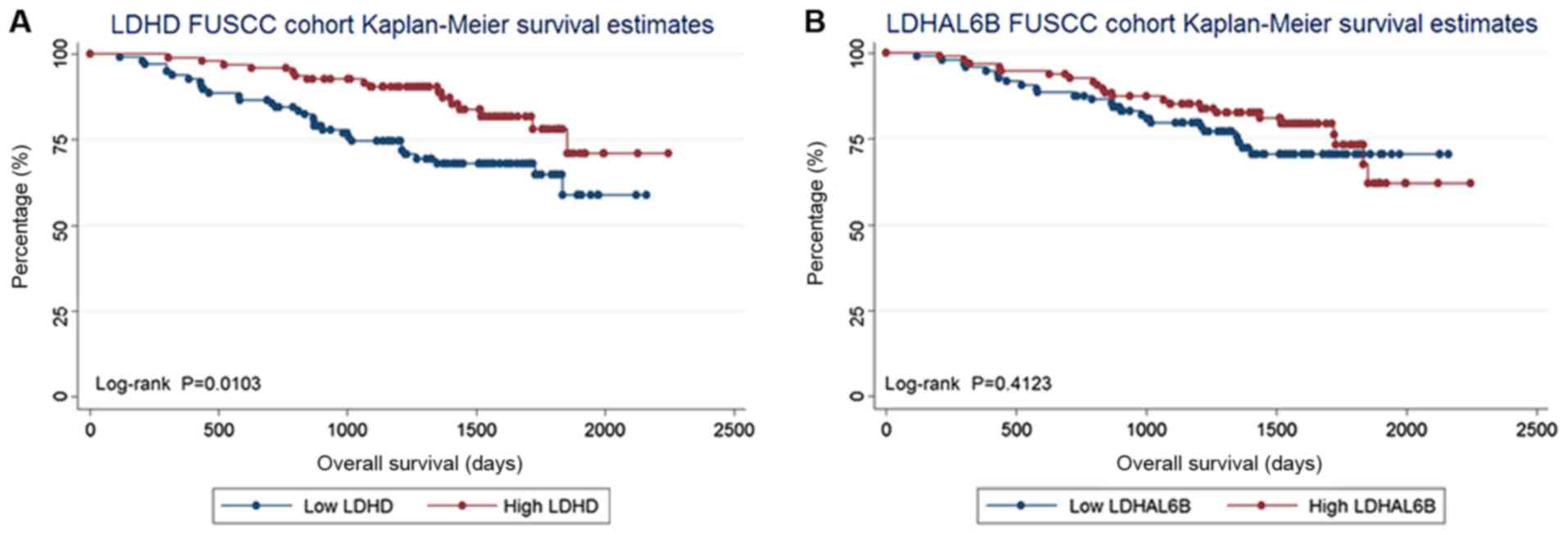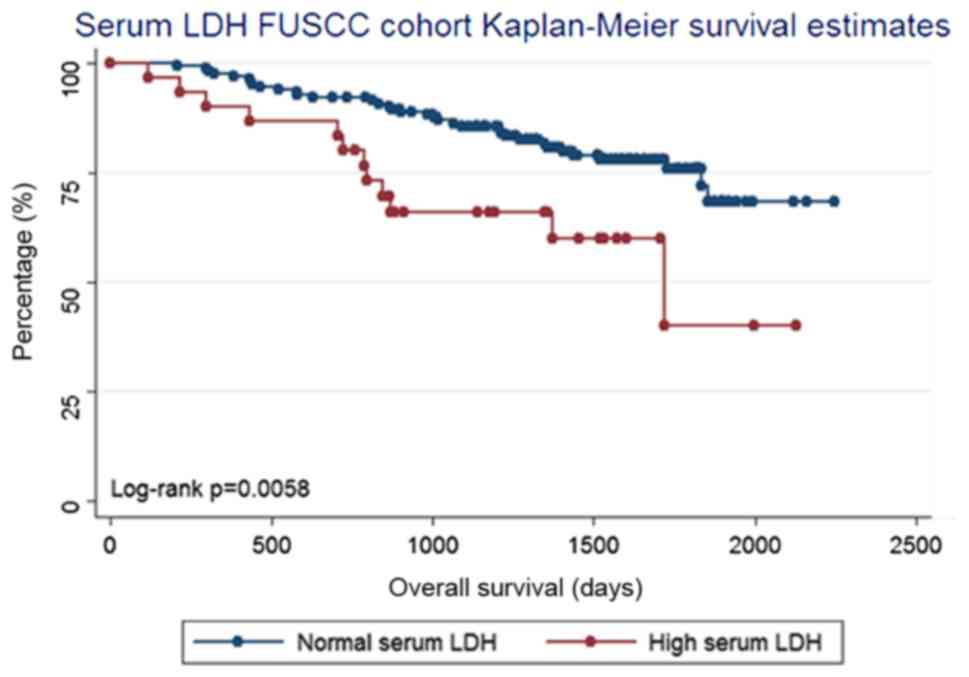|
1
|
Linehan WM, Srinivasan R and Schmidt LS:
The genetic basis of kidney cancer: A metabolic disease. Nat Rev
Urol. 7:277–285. 2010. View Article : Google Scholar : PubMed/NCBI
|
|
2
|
Simard EP, Ward EM, Siegel R and Jemal A:
Cancers with increasing incidence trends in the United States: 1999
through 2008. CA Cancer J Clin. 62:118–128. 2012. View Article : Google Scholar : PubMed/NCBI
|
|
3
|
Siegel R, Naishadham D and Jemal A: Cancer
statistics, 2012. CA Cancer J Clin. 62:10–29. 2012. View Article : Google Scholar : PubMed/NCBI
|
|
4
|
Ridge CA, Pua BB and Madoff DC:
Epidemiology and staging of renal cell carcinoma. Semin Intervent
Radiol. 31:3–8. 2014. View Article : Google Scholar : PubMed/NCBI
|
|
5
|
Chow WH, Dong LM and Devesa SS:
Epidemiology and risk factors for kidney cancer. Nat Rev Urol.
7:245–257. 2010. View Article : Google Scholar : PubMed/NCBI
|
|
6
|
Liang L, Li L, Zeng J, Gao Y, Chen YL,
Wang ZQ, Wang XY, Chang LS and He D: Inhibitory effect of silibinin
on EGFR signal-induced renal cell carcinoma progression via
suppression of the EGFR/MMP-9 signaling pathway. Oncol Rep.
28:999–1005. 2012.PubMed/NCBI
|
|
7
|
Maher ER: Genomics and epigenomics of
renal cell carcinoma. Semin Cancer Biol. 23:10–17. 2013. View Article : Google Scholar : PubMed/NCBI
|
|
8
|
Ficarra V, Galfano A, Novara G, Iafrate M,
Brunelli M, Secco S, Cavalleri S, Martignoni G and Artibani W: Risk
stratification and prognostication of renal cell carcinoma. World J
Urol. 26:115–125. 2008. View Article : Google Scholar : PubMed/NCBI
|
|
9
|
Burgner JW II and Ray WJ Jr: On the origin
of the lactate dehydrogenase induced rate effect. Biochemistry.
23:3636–3648. 1984. View Article : Google Scholar : PubMed/NCBI
|
|
10
|
Brown JE, Cook RJ, Lipton A and Coleman
RE: Serum lactate dehydrogenase is prognostic for survival in
patients with bone metastases from breast cancer: A retrospective
analysis in bisphosphonate-treated patients. Clin Cancer Res.
18:6348–6355. 2012. View Article : Google Scholar : PubMed/NCBI
|
|
11
|
Shen J, Chen Z, Zhuang Q, Fan M, Ding T,
Lu H and He X: Prognostic value of serum lactate dehydrogenase in
renal cell carcinoma: A systematic review and meta-analysis. PLoS
One. 11:e01664822016. View Article : Google Scholar : PubMed/NCBI
|
|
12
|
Chen Y, Zhang H, Xu A, Li N, Liu J, Liu C,
Lv D, Wu S, Huang L, Yang S, et al: Elevation of serum l-lactate
dehydrogenase B correlated with the clinical stage of lung cancer.
Lung cancer. 54:95–102. 2006. View Article : Google Scholar : PubMed/NCBI
|
|
13
|
Wang ZX, Yang LP, Qiu MZ, Wang ZQ, Zhou
YX, Wang F, Zhang DS, Wang FH, Li YH and Xu RH: Prognostic value of
preoperative serum lactate dehydrogenase levels for resectable
gastric cancer and prognostic nomograms. Oncotarget. 7:39945–39956.
2016.PubMed/NCBI
|
|
14
|
Armstrong AJ, George DJ and Halabi S:
Serum lactate dehydrogenase predicts for overall survival benefit
in patients with metastatic renal cell carcinoma treated with
inhibition of mammalian target of rapamycin. J Clin Oncol.
30:3402–3407. 2012. View Article : Google Scholar : PubMed/NCBI
|
|
15
|
Cetin B, Afsar B, Deger SM, Gonul II,
Gumusay O, Ozet A, Benekli M, Coskun U and Buyukberber S:
Association between hemoglobin, calcium, and lactate dehydrogenase
variability and mortality among metastatic renal cell carcinoma.
Int Urol Nephrol. 46:1081–1087. 2014. View Article : Google Scholar : PubMed/NCBI
|
|
16
|
Adeva-Andany M, López-Ojén M,
Funcasta-Calderón R, Ameneiros-Rodríguez E, Donapetry-García C,
Vila-Altesor M and Rodríguez-Seijas J: Comprehensive review on
lactate metabolism in human health. Mitochondrion. 17:76–100. 2014.
View Article : Google Scholar : PubMed/NCBI
|
|
17
|
Fan J, Hitosugi T, Chung TW, Xie J, Ge Q,
Gu TL, Polakiewicz RD, Chen GZ, Boggon TJ, Lonial S, et al:
Tyrosine phosphorylation of lactate dehydrogenase A is important
for NADH/NAD(+) redox homeostasis in cancer cell. Mol Cell Biol.
31:4938–4950. 2011. View Article : Google Scholar : PubMed/NCBI
|
|
18
|
Markert CL, Shaklee JB and Whitt GS:
Evolution of a gene. Multiple genes for LDH isozymes provide a
model of the evolution of gene structure, function and regulation.
Science. 189:102–114. 1975. View Article : Google Scholar : PubMed/NCBI
|
|
19
|
Sun Q, Chen X, Ma J, Peng H, Wang F, Zha
X, Wang Y, Jing Y, Yang H, Chen R, et al: Mammalian target of
rapamycin up-regulation of pyruvate kinase isoenzyme type M2 is
critical for aerobic glycolysis and tumor growth. Proc Natl Acad
Sci USA. 108:4129–4134. 2011. View Article : Google Scholar : PubMed/NCBI
|
|
20
|
Zha X, Wang F, Wang Y, He S, Jing Y, Wu X
and Zhang H: Lactate dehydrogenase B is critical for hyperactive
mTOR-mediated tumorigenesis. Cancer Res. 71:13–18. 2011. View Article : Google Scholar : PubMed/NCBI
|
|
21
|
Hoffmann R, Franzke A, Buer J, Sel S,
Oevermann K, Duensing A, Probst M, Duensing S, Kirchner H, Ganser A
and Atzpodien J: Prognostic impact of in vivo soluble cell adhesion
molecules in metastatic renal cell carcinoma. Br J Cancer.
79:1742–1745. 1999. View Article : Google Scholar : PubMed/NCBI
|
|
22
|
Sobin LH and Fleming ID: TNM
classification of malignant tumors, fifth edition (1997). Union
Internationale Contre le Cancer and the American Joint Committee on
Cancer. Cancer. 80:1803–1804. 1997. View Article : Google Scholar : PubMed/NCBI
|
|
23
|
Rioux-Leclercq N: The Fuhrman grading
system for kidney cancer prognosis. Prog Urole. 16(4 Suppl): FMC):.
S5–S8. 2006.(In French).
|
|
24
|
Kim SP, Alt AL, Weight CJ, Costello BA,
Cheville JC, Lohse C, Allmer C and Leibovich BC: Independent
validation of the 2010 American Joint Committee on Cancer TNM
classification for renal cell carcinoma: Results from a large,
single institution cohort. J Urol. 185:2035–2039. 2011. View Article : Google Scholar : PubMed/NCBI
|
|
25
|
Livak KJ and Schmittgen TD: Analysis of
relative gene expression data using real-time quantitative PCR and
the 2(-Delta Delta C(T)) method. Methods. 25:402–408. 2001.
View Article : Google Scholar : PubMed/NCBI
|
|
26
|
Gallo M, Sapio L, Spina A, Naviglio D,
Calogero A and Naviglio S: Lactic dehydrogenase and cancer: An
overview. Front Biosci (Landmark Ed). 20:1234–1249. 2015.
View Article : Google Scholar : PubMed/NCBI
|
|
27
|
Gleason FH and Nolan RA: D(−)-lactate
dehydrogenase in lower fungi. Science. 152:1272–1273. 1966.
View Article : Google Scholar : PubMed/NCBI
|
|
28
|
Rojo EE, Guiard B, Neupert W and Stuart
RA: Sorting of D-lactate dehydrogenase to the inner membrane of
mitochondria. Analysis of topogenic signal and energetic
requirements. J Biol Chem. 273:8040–8047. 1998. View Article : Google Scholar : PubMed/NCBI
|
|
29
|
Lapierre L, Germond JE, Ott A, Delley M
and Mollet B: D-Lactate dehydrogenase gene (ldhD) inactivation and
resulting metabolic effects in the Lactobacillus johnsonii strains
La1 and N312. Appl Environ Microbiol. 65:4002–4007. 1999.PubMed/NCBI
|
|
30
|
de Bari L, Moro L and Passarella S:
Prostate cancer cells metabolize d-lactate inside mitochondria via
a D-lactate dehydrogenase which is more active and highly expressed
than in normal cells. FEBS Lett. 587:467–473. 2013. View Article : Google Scholar : PubMed/NCBI
|
|
31
|
Pagala VR, Park J, Reed DW and Hartzell
PL: Cellular localization of D-lactate dehydrogenase and NADH
oxidase from Archaeoglobus fulgidus. Archaea. 1:95–104. 2002.
View Article : Google Scholar : PubMed/NCBI
|
|
32
|
Bernard N, Johnsen K, Holbrook JJ and
Delcour J: D175 discriminates between NADH and NADPH in the
coenzyme binding site of Lactobacillus delbrueckii subsp.
bulgaricus D-lactate dehydrogenase. Biochem Biophys Res Commun.
208:895–900. 1995. View Article : Google Scholar : PubMed/NCBI
|
|
33
|
Kim JW and Dang CV: Cancer's molecular
sweet tooth and the Warburg effect. Cancer Res. 66:8927–8930. 2006.
View Article : Google Scholar : PubMed/NCBI
|
|
34
|
de Saedeleer CJ, Copetti T, Porporato PE,
Verrax J, Feron O and Sonveaux P: Lactate activates HIF-1 in
oxidative but not in Warburg-phenotype human tumor cells. PLoS One.
7:e465712012. View Article : Google Scholar : PubMed/NCBI
|
|
35
|
von Eyben FE, Madsen EL, Liu F, Amato R
and Fritsche H: Serum lactate dehydrogenase isoenzyme 1 as a
prognostic predictor for metastatic testicular germ cell tumours.
Br J Cancer. 83:1256–1259. 2000. View Article : Google Scholar : PubMed/NCBI
|
|
36
|
Halabi S, Small EJ, Kantoff PW, Kattan MW,
Kaplan EB, Dawson NA, Levine EG, Blumenstein BA and Vogelzang NJ:
Prognostic model for predicting survival in men with
hormone-refractory metastatic prostate cancer. J Clin Oncol.
21:1232–1237. 2003. View Article : Google Scholar : PubMed/NCBI
|
|
37
|
Agarwala SS, Keilholz U, Gilles E,
Bedikian AY, Wu J, Kay R, Stein CA, Itri LM, Suciu S and Eggermont
AM: LDH correlation with survival in advanced melanoma from two
large, randomised trials (Oblimersen GM301 and EORTC 18951). Eur J
Cancer. 45:1807–1814. 2009. View Article : Google Scholar : PubMed/NCBI
|
|
38
|
Kim JW and Dang CV: Multifaceted roles of
glycolytic enzymes. Trends Biochem Sci. 30:142–150. 2005.
View Article : Google Scholar : PubMed/NCBI
|
|
39
|
Cho E, Giovannucci EL and Joh HK:
Nutrients related to one-carbon metabolism and risk of renal cell
cancer. Cancer Causes Control. 24:373–382. 2013. View Article : Google Scholar : PubMed/NCBI
|
|
40
|
Yang OC, Maxwell PH and Pollard PJ: Renal
cell carcinoma: Translational aspects of metabolism and therapeutic
consequences. Kidney Int. 84:667–681. 2013. View Article : Google Scholar : PubMed/NCBI
|
|
41
|
Serganova I, Rizwan A, Ni X, Thakur SB,
Vider J, Russell J, Blasberg R and Koutcher JA: Metabolic imaging:
A link between lactate dehydrogenase A, lactate, and tumor
phenotype. Clin Cancer Res. 17:6250–6261. 2011. View Article : Google Scholar : PubMed/NCBI
|
|
42
|
Girgis H, Masui O, White NM, Scorilas A,
Rotondo F, Seivwright A, Gabril M, Filter ER, Girgis AH, Bjarnason
GA, et al: Lactate dehydrogenase A is a potential prognostic marker
in clear cell renal cell carcinoma. Mol Cancer. 13:1012014.
View Article : Google Scholar : PubMed/NCBI
|
|
43
|
Santel T, Pflug G, Hemdan NY, Schäfer A,
Hollenbach M, Buchold M, Hintersdorf A, Lindner I, Otto A, Bigl M,
et al: Curcumin inhibits glyoxalase 1: A possible link to its
anti-inflammatory and anti-tumor activity. PLoS One. 3:e35082008.
View Article : Google Scholar : PubMed/NCBI
|
|
44
|
Rulli A, Carli L, Romani R, Baroni T,
Giovannini E, Rosi G and Talesa V: Expression of glyoxalase I and
II in normal and breast cancer tissues. Breast Cancer Res Treat.
66:67–72. 2001. View Article : Google Scholar : PubMed/NCBI
|
|
45
|
Meng H, Liu P, Sun H, Cai Z, Zhou J, Lin J
and Li Y: Engineering a d-lactate dehydrogenase that can
super-efficiently utilize NADPH and NADH as cofactors. Sci Rep.
6:248872016. View Article : Google Scholar : PubMed/NCBI
|

















